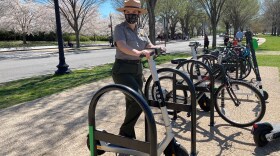-
In the early part of the 20th century, Lincoln Hills was a retreat in the mountains west of Denver created for Black American families to spend time in the outdoors. A new exhibit at History Colorado in Denver explores the legacy of this haven during an era of segregation. We learn more about Lincoln Hills on today’s In The NoCo.
-
A hotter, drier future means advocates have to get creative to keep water in streams.
-
Putting a value on the state’s river recreation economic impact is a challenge.
-
Parks for whitewater kayaking hold a special legal status, but some river experts say it's time for Colorado's water law to evolve.
-
Rock climbing without ropes comes with risks and rewards. This climber set out to crunch the numbersBoulder is a hot spot for rock climbing... and many climbers engage in something even riskier called ‘scrambling.’ This involves climbing huge rock faces without using ropes. Today on In the NoCo you’ll hear from a Boulder man who dug into a century’s worth of data around scrambling accidents – and it changed how he approaches his favorite hobby as a result.
-
Green Mountain was periodically leased by the Colorado Army National Guard for pre-WWII military training between 1903 and 1939, which included everything from small arms to live-fire artillery training on the north and east sides of the mountain. Cleanups continue today.
-
Thanks to a new initiative, private landowners in Colorado and Wyoming are now letting people cross through their property for free to access these acres.
-
How Colorado’s small outdoor businesses are coping with pressure from Trump’s threatened tariffsThe threat of tariffs is creating uncertainty for many Colorado companies – including small businesses that make or sell outdoor recreation gear. We hear about how tariff turmoil is affecting these companies’ bottom line – and how they’re coping with it.
-
An uncertain future of new tariffs has the Colorado outdoor industry concerned. New and longtime brands are now preparing for what's next.
-
The proposal would give each park superintendent the authority to decide where micromobility devices can go. Some public lands groups worry they'll be permitted in environmentally-sensitive areas.

Play Live Radio
Next Up:
0:00
0:00
Available On Air Stations










